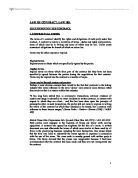Analyze the contribution of psychological contract literature to the understanding of OCB.
Analyze the contribution of psychological contract literature to the understanding of OCB.
The aim of this essay is to analyze the contribution of the psychological contract literature to the understanding of organizational citizenship behaviour (“OCB”). We shall argue that while the concept of psychological contract provides a useful framework for the understanding of why an employee may engage in OCB, its capacity to help managers adopt measures to foster greater levels of OCB among employees is considerably hindered as a result of the adoption by a majority of researchers of the definition proposed by Rousseau (1989, 1997) which is characterized by a focus on individuals’ perceptions of promises made by organizations rather than on the actual content of these promises, as supposed they even exist.
OCB has been defined by Organ (1988) as “behaviour that is discretionary, not directly or explicitly recognized by the formal reward system, and that in aggregate promotes the effective functioning of the organization”. The process through which an employee comes to engage in OCB has been described in the OCB literature has being strongly dependant upon individually-based perceptions of organizational procedural justice (Tepper, Lockhart and Hoobler 2001) as mediated by psychological elements such as trust and organizational commitment (Tepper, Lockhart and Hoobler 2001). This process is marked by a succession of exchange relationships through which employees reciprocate what they perceive to be favourable treatments from their employer (Organ 1990; Coyle-Shapiro, Kesler and Purcell 2004). Similarly, researchers writing about the notion of psychological contract have pointed out that the development of an individual’s psychological contract constitutes a gradual process through which emerge mental schemas about the evolution of the employment relationship (Rousseau 1997). According to this framework, employees “reciprocate employer treatment through a cognitive dimension” (Coyle-Shapiro, Kesler and Purcell 2004) in accordance with their perceptions of procedural justice demonstrated by the organization (Coyle-Shapiro and Kesler 2003; Robinson et al. 1994). Therefore, since literatures about OCB and psychological contract both originate from social exchange theory (Coyle-Shapiro and Conway 2004), thus sharing common mechanisms and assumptions, it results that the framework that each literature seeks to expand offer good level of compatibility with the other.
Two of the most intriguing features of the psychological contract framework for the study of OCB have been breach and violation. Breach, and hence violation, are subjective constructs (Morrison & Robinson 2000). Through the norm of reciprocity, common to both OCB and psychological frameworks, the psychological contract framework thus provides an explanation for why a particular individual may refrain from engaging in OCB. This has in fact been demonstrated by Robinson & Morrison (1995) whose study showed that perceived employer contract breach leads employees to reciprocate by “withdrawing OCB”. Importantly however, the potentiality for the perception of a breach varies among individuals according to certain factors (Morrison & Robinson 2000). One such factor has been labeled as being vigilance, which Morrison & Robinson (1997) defined as “the degree to which an employee actively monitors how well the organization is fulfilling his or her psychological contract”. The importation of the vigilance concept into the OCB framework helps explain why certain employees may still engage in OCB even when confronted to situations that would objectively amount to a contract breach. Essential to this argument is the previously mentioned idea that whether an employee engages in OCB depends upon a succession of beneficial exchange relationships within the organization (Organ 1990). Ceteri paribus, high OCB has been shown to be especially salient among employees counting many years of experience within the same organization (Van Dyne et al. 1994). Considering that organizational trust moderates the relation between procedural justice and OCB (Tepper, Lockhart and Hoobler 2001) and since vigilance is negatively associated with both organizational trust and opportunities of employment (Morrison & Robinson 2000), it can be posited that employees who have achieved a high degree of OCB have come over time to forfeit other job opportunities and developed high trust in their employment relationships, thus achieving lower vigilance toward possible breach. Acknowledging that breach does not necessarily equate with violation (Morrison & Robinson 1997), it could be that the only situations in which employees highly involved in OCB would stop reciprocating their employer through OCB would be upon the occurrence of events of sufficient magnitude to cause both breach and violation. Support for this argument could be found in a study performed by Robinson & Rousseau (1994) that showed that employees who exhibit a strong attachment to their employers are more likely to react adversely to contract violations. The psychological contract framework therefore appears appropriate for the study of the causes explaining why an individual withdraw from OCB, although any explanations that is derived from it will generally be individual-specific, as it shall be discussed in the following paragraphs.







